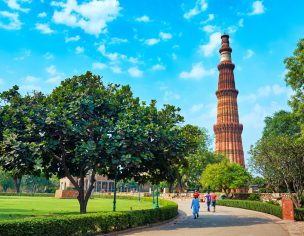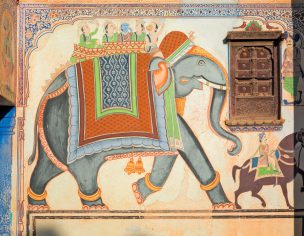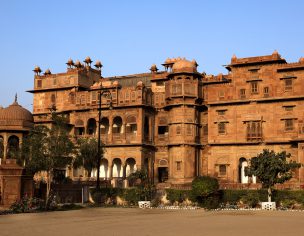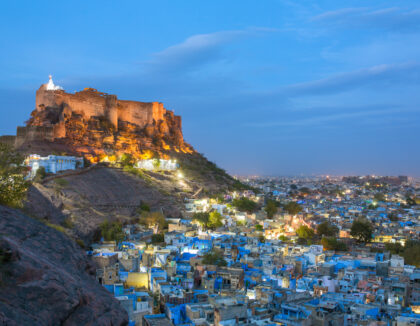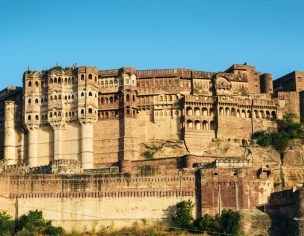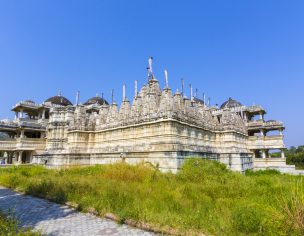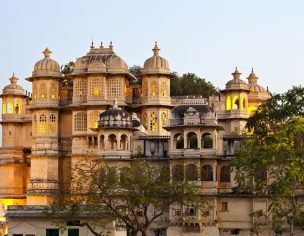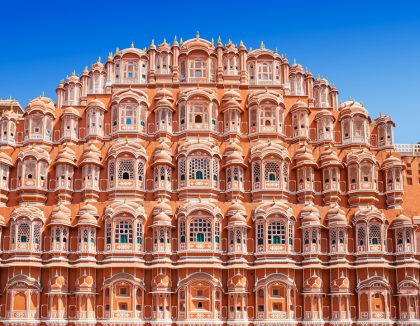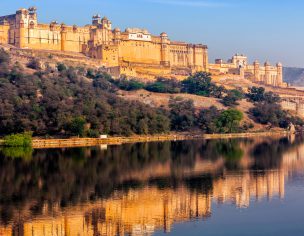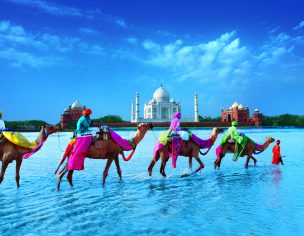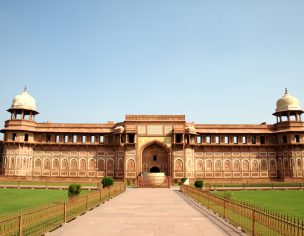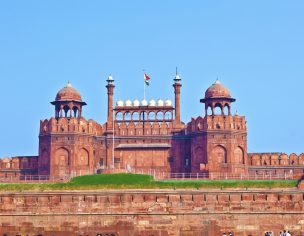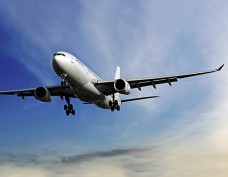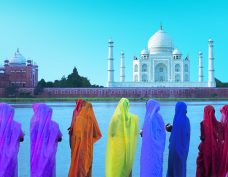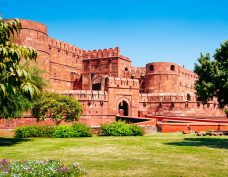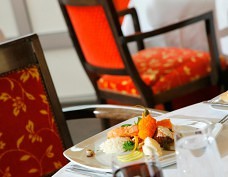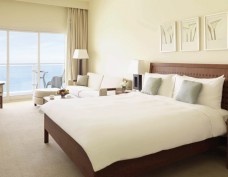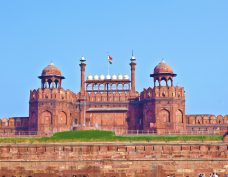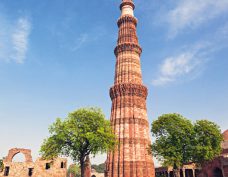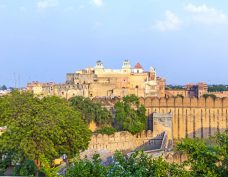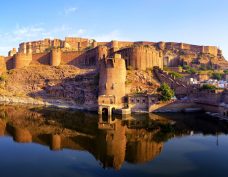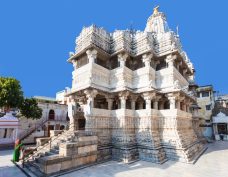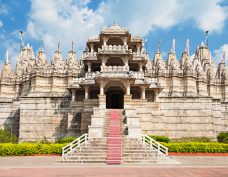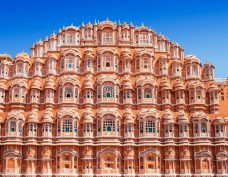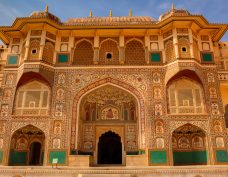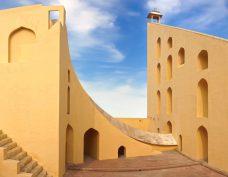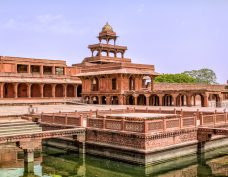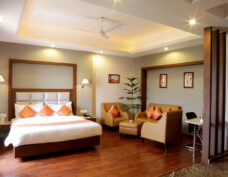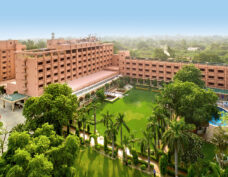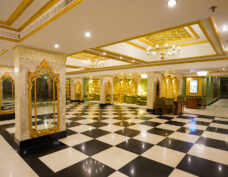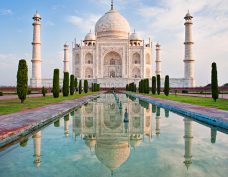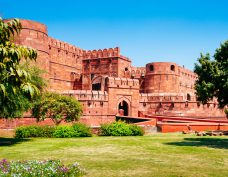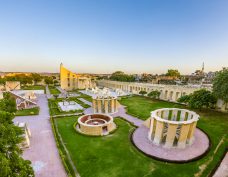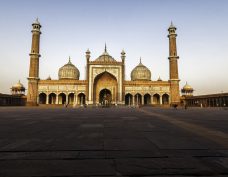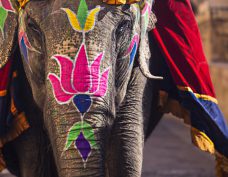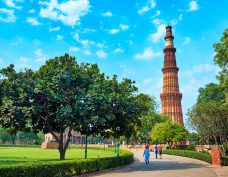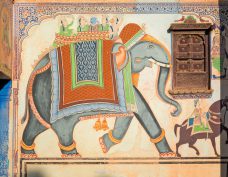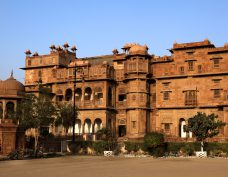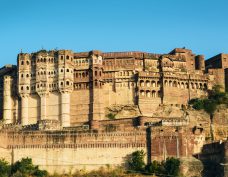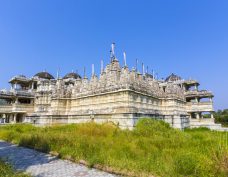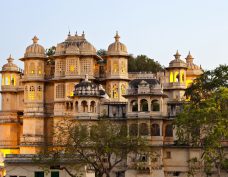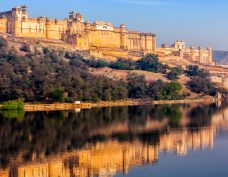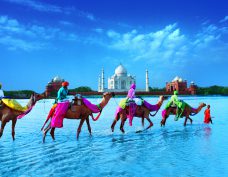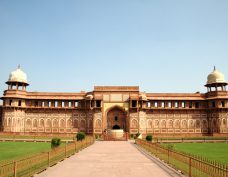Comparison of temperatures
| Jan | Feb | Mar | Apr | May | Jun | Jul | Aug | Sep | Oct | Nov | Dec |
| New Delhi | 20 | 24 | 28 | 35 | 38 | 36 | 35 | 33 | 32 | 30 | 28 | 22 |
| London | 6 | 8 | 9 | 11 | 15 | 20 | 21 | 20 | 19 | 15 | 10 | 7 |
General note:
Below is an information overview. The conditions of entry, as well as the political and health situation, can change anywhere in the world at any time. We therefore recommend checking before your trip. Please check the website of the Foreign Office (www.gov.uk/) before your departure.
Form of government:
Parliamentary democracy: Federation (28 states, 8 union territories and the National Capital Territory of Delhi). The head of state is Draupadi Murmu since July 2022.
Capital:
New Delhi (approx. 31 million inhabitants)
Religion:
Hinduism (approx. 79.8%), Islam (approx. 14.2%), Christianity (approx. 2.3%), Sikhism (approx. 1.7%) as well as Buddhism, Jainism, Parsism and others.
Language:
Hindi and English are the official languages, 21 other languages are recognised.
Climate:
Monsoon period (July to September), hot dry period (April to June); Northern India is subject to stronger seasonal climates.
Electricity:
230 volt alternating current, 50 hertz. An adapter is necessary.
Local time:
The time difference to the UK is UTC +5.5 hours. Daylight saving time is not observed.
Making telephone calls:
The dialling code for long-distance calls from the UK to India is 0091. Dial 0044 and drop the 0 from the local code when calling the UK from India.
Country and people:
In India, women are seldom greeted by a handshake. It is more common to use the “Namaste” greeting, whereby your hands are folded as if in prayer. Public displays of affection between men and women are uncommon.
In India, it is customary to give tips. Similarly to the USA, this forms part of their income for people working in the sector. Moreover, it symbolises recognition for the service provided. One can tip chambermaids around £ 1.50 per room and night. In a restaurant or taxi, tipping around 10% of the billed sum is customary. Tips are not given in shops. On group trips, we recommend around £ 2.50 per person per day for the tour leader, and around £ 2 per person per day for the bus driver. Of course, everyone may decide for themselves whether and how much of a tip they wish to give.
Food and drink:
The main products are rice, various types of flatbread (Chapati, Roti, Naan) and lentils. Specialties vary strongly between regions and are determined by regional spices.
Traditionally, cutlery is not used for dining. Only your right hand is used when eating. This does not mean, however, that forks or spoons are entirely unheard of. Tourists need not dispense with them entirely.
Entry requirements for British citizens:
British citizens need to obtain a visa before travelling to India. Holders of passports endorsed as ‚British citizen‘ who meet the eligibility criteria can apply for a single-entry e-Tourist Visa (e-TV) to enter India at certain designated airports. You can apply for the visa and find more information about the eligibility criteria on the government of India’s e-Tourist Visa website: https://indianvisaonline.gov.in/evisa/tvoa.html. The e-Tourist Visa can only be used for a double entry to India. Applicants should carry a copy of their e-TV with them at the time of travel. We advise applicants to apply for their Indian visa a maximum of 30 days and a minimum of 4 days in advance of the date of arrival. The e-Tourist Visa is valid for 30 days from the date of arrival in India.
You can also apply for a visa at one of the ‚Indian Visa Application Centres‘. A list of these IVACs is available on the VFS website https://www.vfsglobal.com/india/uk/ The validity of the visa begins from the date of issue by the High Commission of India and not from the date of travel on your application form. We advise applicants to apply for their Indian visa a few weeks before their scheduled travel dates. Make sure you get the right visa for your trip.
Your passport must be machine-readable, with 2 blank pages for your visa and valid for a minimum of 6 months at the time of entry to India. If you need further information, please contact the embassy, high commission or consulate of the territory you are travelling to. Citizens of other countries are advised to contact the Indian embassy for details on the entry requirements applying to them. Whilst we endeavour to provide guidance where necessary, we can not be responsible for any problems encountered (whether at any point of entry or elsewhere) in the event that passport and visa requirements are not satisfied.
Tour guides:
Your expert tour guides will be able to provide you with detailed information about the country, people, history, culture etc., and offer advice and assistance for organising your trip. They can also help with room allocation and look forward to welcoming you with initial information. Here you will find out all you need to know and useful information about the trip. We have put together a varied programme including numerous highlights, enabling you to experience the culture and diversity of landscape that India has to offer, and learn all about the country and its people.
Additional packages:
Although your trip already includes a comprehensive package, you also have the option of choosing added extras. We recommend booking the following packages:
Cultural package: The package includes all admission fees and English-language guided tours to the sights according to the itinerary as well as the three exciting excursions ‚Indian folklore evening with camel train ride and traditional dancing in Rajasthan‘, ‚Rickshaw drive through Jaipur‘ and ‚Boat trip on Lake Pichola‘: only £229* per person.
Gourmet package: The package includes comfortable half-board, i.e. 11× delicious dinner: only £159* per person
* Package prices may vary when booking on site.
Currency/Banks/Credit cards:
The unit of currency is the Indian rupee (INR). 1 INR = 100 Paise. Exchange rate (June 2024): 1 GBP = 105,50 INR; 1 INR = 0.01 GBP
Many ATMs in India permit cash withdrawals using an EC card or credit cards which are part of the Maestro system. But most banks in India charge fees for this service. Fees range between £1.30 and £8.40. Fees may also be incurred by your own bank. If you require more information on such fees prior to travel, you are advised to enquire about the co-operations between your bank and banks in India. A transaction fee is also charged for credit cards. Some ATMs have a limit of 20.000 rupees while others have higher limits. A sufficient number of ATMs, most of which are available 24/7, can be found in city centres and larger towns. Nevertheless, visitors should withdraw sufficient sums of cash from ATMs on arrival in order to avoid financial bottlenecks. As a general rule, money can be exchanged at the international airports and in major banks. Most banks are open from 10 am to 2 pm, Monday to Friday. Transaction receipts should be saved.
Customs regulations:
Import: Sums of money of up to £ 7,840 and items of high value (e.g. video cameras) must be declared on entering the country. Gold coins or bars, weapons and pornographic materials may not be brought into the country. The same applies to Indian currency.
Export: Protected animal hides and plants may not be taken out of the country. The same applies to Indian currency. Violations against custom regulations may trigger arrests on leaving the country.
Important: If you are travelling to Great Britain from outside the UK, your personal allowances mean you can bring in a certain amount of goods without paying tax or duty. If you go over your allowances you must declare all your goods and pay tax and duty on all the goods in that category. Please inform yourself about the current customs regulations: www.gov.uk/bringing-goods-intouk-personal-use/arriving-in-Great-Britain.
Safety information specific to India:
Travellers are advised to stay away from large crowds of people, to exercise particular vigilance and stay informed of current events immediately prior to and during the trip. Instructions provided by local authorities must be followed. The risk of foreign travellers becoming victims of violent crime is quite low in India‘s tourist areas. Nevertheless, travellers should always be careful. Consideration should be taken of the fact that tourists – especially in Rajasthan and Goa – have repeatedly fallen prey to well-organised con artists offering lucrative deals with precious stones, for example.
Special criminal provisions:
The possession of drugs is severely punishable in India. Different regulations concerning the purchase and consumption of alcohol apply in individual Indian states. In most states, for example, alcohol is only permissible for medical purposes. Penalties can be very severe. Travellers are advised to obtain information on the applicable regulations governing the purchase and consumption of alcohol in the respective states. Same-sex partnerships are no more punishable since 2018. Same-sex partners are nevertheless advised to behave inconspicuously in public.
The possession and use of satellite phones is prohibited in India and is punishable by law.
Possession of and trade in e-cigarettes has been prohibited since the end of November 2019 and can be punished with heavy fines or even imprisonment.
Medical information:
At least 8 weeks before your trip, check the latest country-specific health advice from the National Travel Health Network and Centre (NaTHNaC) on the TravelHealthPro website (https://travelhealthpro.org.uk/countries). Each country-specific page has information on vaccine recommendations, any current health risks or outbreaks, and factsheets with information on staying healthy abroad. Vaccinations against Hepatitis A, Tetanus and Typhoid are recommended for most travellers visiting India.
Diarrhoea: This can be prevented by taking the corresponding precautions. Basic rules include filtering or boiling tap water, consuming beverages in original packaging only and only using drinking water to brush your teeth or rinse food. Meat should be cooked through before consumption and not eaten raw.
Infectious diseases: Before travelling to India, please consult a medical outreach clinic or a travel medic for information on possible infectious diseases.
Malaria: With the exception of higher altitudes above approx. 1640 yd, a medium risk of transmission of malaria prevails in India all year round, with cases increasing during the monsoon period in particular. Nor are India‘s major cities exempt from this risk: an increase in cases of malaria has been recorded in recent years in Mumbai and New Delhi in particular. Symptoms may occur weeks to months after your trip and are caused by a bite by the blood-sucking anopheles mosquito which is nocturnal. If a fever arises during this time, it is necessary to inform the attending physician of your stay in a malarial area.
Medication and personal adjustment thereof should be discussed with a specialist in tropical/travel medicine prior to ingestion. You are advised to take sufficient supplies of medicine with you for so-called emergency treatment although the administration of preventive medicine is not generally recommended. In India, there is also the risk of purchasing counterfeit drugs. Owing to the infection risks associated with mosquitoes, all travellers are advised to
• wear light-coloured full-length clothing (long trousers, long shirts)
• apply insect repellent to all exposed body parts several times a night (malaria)
• to sleep under a mosquito net if necessary.
Medical care:
Medical care is inadequate in vast areas of the country and does not usually correspond with European standards in terms of medicine, hygiene, technology or organisation. Language barriers can make communication considerably more difficult, especially in rural areas. In large cities, medical care in all specialist areas is usually of a high to very high level which also makes it significantly more expensive. It is common practice to pay a considerable down payment prior to commencing treatment which can often blow travellers’ budgets in the event of serious illness requiring intensive treatment.
Supplies of reliable medication and uninterrupted cooling chains are not guaranteed in all places. Travellers should take sufficient supplies of medication to be taken regularly and have their doctor provide confirmation in English of their necessity for presentation on entering the country. It must be assumed that counterfeit products are sold instead of official medication, especially in smaller pharmacies. People who are chronically ill and requiring treatment must be aware of the health risks associated with travelling to India. Make sure you have private travel health insurance. Such policies usually also offer benefits not covered by state health insurance companies, e.g. the costs of repatriation.
The customer must establish for himself that his physical and mental state is compatible with the selected journey. He is obliged to obtain information about the degrees of physical mobility and mental autonomy required for this journey.
All information is subject to change/Last updated: June 2024
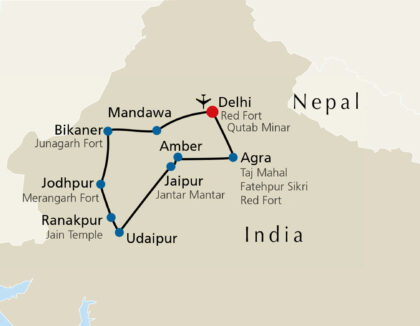
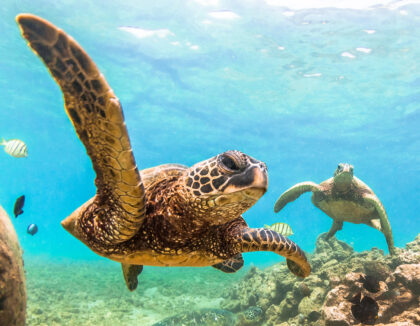 Travel highlights
Travel highlights
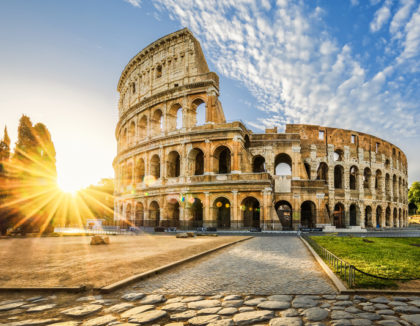 Europe
Europe
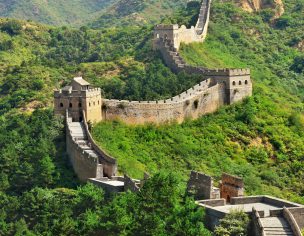 Asia
Asia
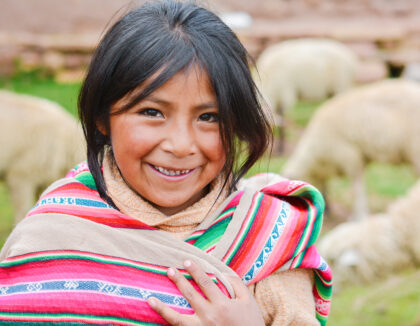 America
America
 Africa
Africa






